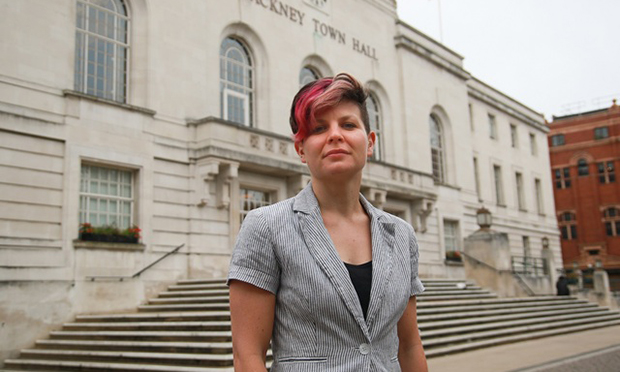Green Party mayoral candidate calls for ‘deep police reform’ as she outlines her priorities for Hackney

Green Party mayoral candidate Zoe Garbett. Photograph: Hackney Greens
Green mayoral hopeful Zoe Garbett is horrified by what happened to Child Q – the Black teenager strip-searched at school after teachers called in police because they thought she smelt of cannabis.
Garbett said: “It should never have happened, it can never be justified.”
The Child Q scandal broke after it emerged the 15-year-old was searched, without an appropriate adult present, whilst she had her period.
Garbett wants to see disciplinary action taken against the teachers and the resignation or dismissal of the police officers and Hackney’s borough commander and wants “deep reform” of the police.
She said what happened to Child Q shows that “suspected cannabis possession is too often used as an excuse by police in Hackney and elsewhere to target young Black people”.
Speaking before the Child Q scandal broke, she criticised drugs policies which “criminalise young people”.
She helped draw up the Green Party’s drugs policy, which calls for an to end stop and search for suspected drug possession and for the police to stop prioritising cannabis.
Garbett said Hackney is already facing tough times in the post-Covid-restrictions world, in which climate change, economic recovery and tackling inequalities are all urgent.
She currently works for the NHS, looking at how it should spend its budget, and has worked for more than 10 years in public health, adult social care, and children and young people’s health services.
The Greens narrowly missed out on gaining one seat on the council in 2018 when they were pipped to the post in Dalston ward, with Labour beating them by 21 votes – the party is hoping to build on that result.
Whoever becomes mayor faces a borough changed by the pandemic, which Garbett says has “laid bare inequalities”.
The council is predicting a budget gap in 2023/24 of between £14m and £28m depending on government funding.
Meanwhile, the number of residents on Universal Credit soared from 13,700 in March 2020 to 35,000 in September 2021 – with two fifths of them struggling despite being in work.
“The cost of living crisis would be a huge priority for me as mayor,” said Garbett.
She would exempt the worst-off from paying council tax and reduce the rent increase for people living in council homes.
“The cost of living increase means everyone is going to feel huge amounts of pressure – there’s a lot of tension,” she said.
She has been involved in the Save Morning Lane and Ridley Road campaigns, which are concerned that people will be priced out of the area.
“The gentrification in Hackney is visible and alarming,” she said. “It’s breaking up communities.”
She fears that the council is at risk of being “at the mercy of developers” to meet affordable housing targets in the borough.
“We need to be much braver in saying no to developers,” she added.
The introduction of low traffic neighbourhoods (LTN) in Hackney has been controversial.
They are designed to cut the use of motor vehicles and improve air quality, but opponents say they have moved the problem to roads just outside the boundaries of the LTNs.
Whilst Garbett pledged to add more LTNs “in suitable areas”, with monitoring to spot negative impacts nearby, she said “people did not feel consulted and did not feel listened to”.
The council ran LTNs as experimental schemes and asked residents what they thought before making some of them permanent.
Garbett said that motor traffic has to reduce by at least 27 per cent to reach London’s net zero carbon target by 2030.
She wants to make every street in Hackney greener and bring in 20 mile per hour speed limits throughout the borough.
She said: “Recent measures taken by the council have cut traffic on some streets while doing little or nothing to improve conditions for others.”
She added: “Every single street in Hackney has toxic air quality, exceeding the latest guidelines from the World Health Organisation. Children, older people and people with long term conditions are particularly at risk.
“I recognise that some car and van journeys will always remain essential. But I want to make it easier and more convenient for Hackney residents to choose to travel in a way that’s healthier for themselves, our community and the whole planet.”
If elected, she said she wanted to listen to residents with a citizens’ assembly to give them more power in decision-making.
“One of my top priorities is to really put the power back to the people.”
She said it’s essential to collaborate with residents to find solutions and pointed to an example from the bike clinic she volunteers at.
“You just see how it changes families’ lives. I had a six-year-old come up and I said ‘You are the expert on your bike, what’s wrong with it?’”
She said by working together the young cyclist helped diagnose the problem, and learnt a new skill to pass on to others.
Young people in Hackney have been hit hard by Covid – with huge disruption to their education and job prospects.
Garbett wants to hold a young people’s question time event and allow the Hackney Youth Parliament to put forward budget amendments, as opposition councillors do.
She would also set ambitious targets to make Hackney greener and play its part in combating climate change, with a borough designed “around residents out wheeling, walking and cycling”.
“I’m absolutely committed to reducing traffic miles by 40 per cent and bringing forward net zero by ten years,” she said.
Hackney Council is currently aiming to be net zero by 2040 – ten years ahead of the government’s target.
Garbett added: “I think it is listening to everybody and not saying, ‘We are making this change tomorrow’. It is an emergency and it is a crisis.”
